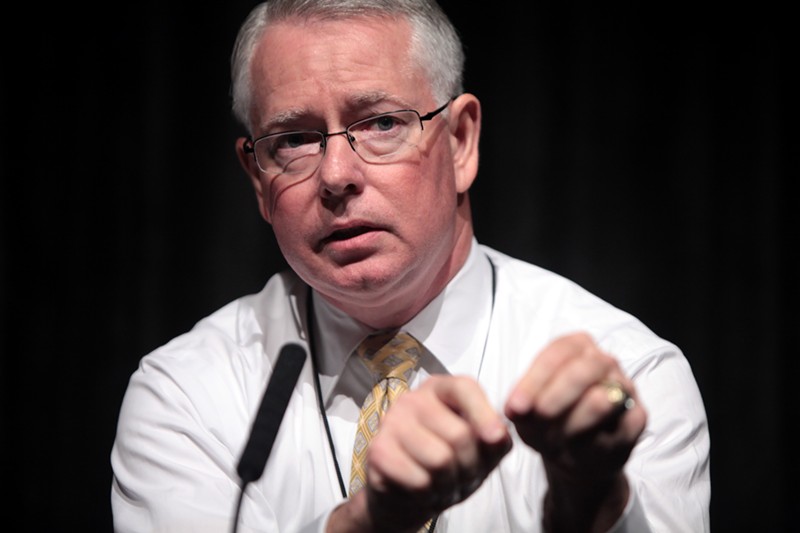But this year, voters get their first change to weigh in on Montgomery. He's up for judicial retention election, meaning voters can choose whether or not to keep him on the state's high court for a full six-year term.
Compared to the slate of high-profile races that will be decided on November 8, judicial races have received scant attention. But they matter, according to Cathy Sigmon, co-founder of Civic Engagement Beyond Voting. People's lives, she said, "are being affected by these rulings and laws" passed down by Arizona's judges.
Sigmon's organization, which is nonpartisan but has a progressive bent, produces Gavel Watch, which provides a rundown of judicial races on the ballot. This year, the group highlighted Montgomery and urged voters to oppose his bid for retention. That recommendation was based, in part, on recent findings by the Commission on Judicial Performance Review.
Gavel Watch considers "whether [judges] bring a preconceived bias into the courtroom and whether they have blatantly violated ethical standards — which I think is the case with Montgomery," Sigmon said.
Montgomery, in a statement to Phoenix New Times, also pointed to the findings from the commission, which voted 19-2 that his performance was satisfactory.
"In my first performance review, the JPR voted overwhelmingly that I met judicial performance standards," Montgomery said.
Montgomery has a storied legacy in Maricopa County. From 2010 to 2019, he led the county attorney's office. He initially won his seat as the county's top prosecutor with the blessing and generous funding of then-Maricopa County Sheriff Joe Arpaio. The controversial sheriff saw Montgomery as a close ally.
For the next nine years, Montgomery helmed the powerful office. He stepped in to defend Arpaio against probes by the U.S. Department of Justice and supported the sheriff's hardline stance on immigration, despite Arpaio's mounting legal troubles. Montgomery also made a name for himself as an anti-marijuana crusader, bringing felony charges against one medical marijuana user for possessing weed-infused candy and forcing people into a marijuana diversion program that spurred legal challenges for being extortive.
Montgomery's tenure at the county attorney's office solidified the agency's hard-line, conservative reputation — a legacy that current County Attorney Rachel Mitchell wants to carry on if she wins a full term. The impact of Montgomery's run is still being felt. Trent Bouhdida, one of many people prosecuted under Montgomery for low-level marijuana offenses, is serving his fourth year of a 16-year prison sentence from 2018.

Governor Doug Ducey has appointed five of the seven Arizona Supreme Court justices.
Gage Skidmore/Creative Commons
A Highly Scrutinized Appointment
By 2019, Bill Montgomery's ambitions had expanded beyond the Maricopa County Attorney's Office. In February 2019, he was eyeing an open seat on the Arizona Supreme Court. He applied but was rejected by the Commission on Appellate Court Appointments in March.Then, just months later as another seat opened up — Montgomery again put his name in the hat. Only by this time, Ducey had replaced three members of the commission who had originally rejected Montgomery. "Miraculously, once Governor Ducey replaced several people on that commission, he was suddenly qualified," Sigmon said.
The commission approved Montgomery's candidacy, and in September, Ducey selected him for the Supreme Court. The pick came despite protests by advocacy groups, including the American Civil Liberties Union.
"We are deeply, deeply concerned that this person who fueled mass incarceration is now trying to be a Supreme Court justice," Analise Ortiz, then an ACLU strategist and now candidate for Arizona state representative, said at the time.
Paul Bender, a professor at Arizona State University's Sandra Day O'Connor College of Law, described the state Supreme Court as "very conservative. Much more conservative than it's ever been since I've been here, and I've been here quite awhile." Ducey has appointed five of the seven current Supreme Court justices.
Given how far to the right the court leans, Bender said, Montgomery is hardly an extremist on the court. "He's somewhere in the middle," he said. But Montgomery oversaw criminal prosecutions in the state's largest county for many years, so he's been forced to recuse himself from many of the criminal cases that come before the high court. That has given him less influence on the court.
But there also have been some concerns raised about Montgomery's conduct on the court, including by the Commission on Judicial Performance Review. The commission makes findings on the performance of judges to inform voters prior to retention elections. It's made up of judges, attorneys, and members of the public who don't work in the legal field.
This year, the commission voted 19-2 that Montgomery met judicial performance standards. The two commissioners in opposition may seem small, but it's the first time in at least a decade, the period of time for which data is available, that a Supreme Court justice did not receive a unanimous vote from the commission. "It's shocking for a Supreme Court justice," Sigmon said.
Three Supreme Court justices — James Beene, Ann Timmer, and Montgomery — face a retention election this year. Beene and Timmer, along with every other judge up for election on the Court of Appeals and in Pinal, Pima, and Coconino counties, received unanimous votes from the commission. In Maricopa County, five judges out of 47 received votes against them, including Maricopa County Superior Court Judge Stephen Hopkins, who has been chided before for misconduct in the courtroom.
It's not totally clear why Montgomery received the votes in opposition. The commission said it reviews a variety of information, including an anonymous survey sent to attorneys and judges, to make its decisions. "It really is a bit opaque," Sigmon said.
For Montgomery, the commission sent surveys to 112 attorneys and 12 judges. Some 12 attorneys and five judges completed the survey, and Montgomery's conduct was rated significantly lower than the two other Supreme Court justices up for retention election this year. Four of the attorneys who responded to the survey rated his temperament as poor, and some flagged issues with his communication style and legal ability.
Montgomery emphasized that his fellow justices rated him highly in their surveys. "Given that this first review occurred during a period of change — from being an advocate to a jurist and during a pandemic — I am grateful that my fellow justices also noted my success during the transition in the surveys they provided," he said.
Montgomery added that the surveys pointed out areas where he could improve his performance.
"While approximately three of the 112 surveys sent out noted particular areas where I could do better, the small number of anonymous surveys actually returned makes it difficult to identify anything systemic in my performance. Nevertheless, I acknowledge the feedback and I look forward to improving my service to the people of Arizona as a Justice on the Arizona Supreme Court," he said.
Montgomery faces strong odds to be retained. "Normally, these things are routine. It's very rare that there's a serious challenge to anyone who's been appointed, especially to the Supreme Court," Bender said. "I don't ever remember a Supreme Court justice being close to being turned down."
If voters do reject Montgomery, he would be removed from office. "It's a system that has not been tested, to my knowledge," Sigmon said. She added that she expected that the usual steps for replacing a Supreme Court justice would then commence.
"I'm just as curious as everyone else to know how that would play out," Sigmon said.










